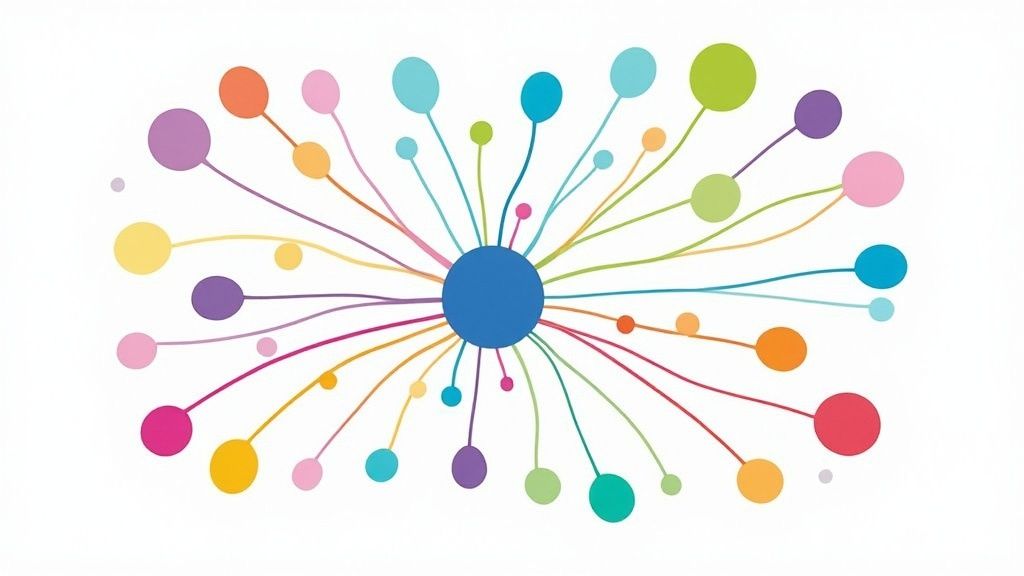Essential Coaching Tools and Techniques: A Complete Guide to Transformational Practice


The Evolution and Impact of Modern Coaching
The practice of coaching has deep historical roots that continue to shape how we help others grow and develop today. By understanding where coaching came from and how it has evolved, we can better appreciate the powerful tools and approaches used by coaches in their work with clients. Let's explore this fascinating journey from ancient wisdom to modern practice.
From Ancient Mentorship to Modern Methods
Coaching's origins trace back to some of humanity's earliest teachers. In ancient Greece, Socrates developed his famous method of asking probing questions to help people examine their beliefs and discover deeper insights. This technique, now known as the Socratic method, remains central to how coaches guide clients toward self-discovery and growth. The field has since grown from informal mentoring relationships into a structured profession, particularly in the 1980s when it began incorporating elements from psychology, athletics, and business consulting. Learn more about coaching's rich history here.
The Rise of Specialized Coaching Techniques
As coaching became more established, practitioners developed specific tools and methods to help clients set goals and gain insights. This shift created a more focused approach that could deliver measurable results. Different types of coaching emerged - from executive leadership to personal development - each with its own set of proven techniques to serve specific client needs.
The Impact of Technology on Coaching Tools
The digital age has opened new possibilities for how coaches work with clients. Video calls, mobile apps, and online platforms make coaching accessible to people anywhere in the world. These tools help coaches track progress, facilitate learning between sessions, and provide support in new ways. Digital assessments and interactive exercises complement traditional coaching conversations while expanding what's possible in the coaching relationship.
The Human Element in Modern Coaching
While technology offers valuable tools, the heart of coaching remains deeply personal and relational. The most effective coaches combine technical skills with essential human qualities like empathy, active listening, and the ability to build trust. These interpersonal abilities create the safe space clients need to explore challenges and pursue growth. Looking ahead, successful coaching will continue to balance helpful technology with the irreplaceable human connection that makes coaching transformational for clients.
Fundamental Coaching Tools for Breakthrough Results

Professional coaches rely on specific tools and methods to help clients achieve meaningful progress. These essential coaching tools create structure, drive insights, and facilitate lasting change. Let's explore the key resources that form the foundation of effective coaching relationships.
Core Assessment Tools for Effective Coaching
Every successful coaching engagement begins with a clear understanding of where the client currently stands and where they want to go. Assessment tools provide coaches with objective data and insights to guide this discovery process. For instance, a thoughtful mix of questionnaires, structured interviews, and visual exercises helps paint a complete picture.
Key assessment tools include:
- Strengths Assessments: These help clients recognize and build upon their natural talents and abilities. When people understand their core strengths, they gain confidence and can direct their energy toward areas where they excel.
- Values Clarification Exercises: By identifying what matters most to them, clients can make choices that truly align with their principles and priorities. This alignment leads to greater satisfaction and meaning.
- Goal-Setting Worksheets: These practical tools use the SMART framework (Specific, Measurable, Achievable, Relevant, Time-bound) to turn vague aspirations into concrete action plans.
Powerful Intervention Techniques for Deeper Impact
Assessment tools lay the groundwork, but specific intervention techniques drive real progress. These methods give coaches practical ways to guide clients through challenges and support their development.
Essential techniques include:
- Active Listening: Giving clients full, undivided attention creates safety and trust. This foundation allows for honest exploration and meaningful breakthroughs.
- Powerful Questioning: Well-crafted questions help clients examine their assumptions, consider new perspectives, and find their own solutions. This builds ownership and accountability.
- Reframing: Helping clients view challenges differently - as opportunities rather than obstacles - can transform limiting beliefs into empowering ones.
Popular tools like the 'Wheel of Life' help clients rate their satisfaction across key life areas to identify priorities. The 'Perfect Day' exercise guides clients in envisioning their ideal future to set inspiring goals. Regular journaling through tools like the 'Reflection Journal' builds self-awareness through thoughtful observation. Learn more about essential coaching tools here.
Building a Personalized Coaching Toolkit
As coaches develop their practice, they build a customized set of tools that matches their style and their clients' needs. This toolkit grows and adapts based on experience and results. The key is selecting tools that feel natural while maintaining professional coaching standards. A well-curated toolkit becomes an invaluable resource for creating lasting positive change.
Measuring and Maximizing Coaching ROI
A data-driven approach to coaching results is essential for demonstrating real value. Both organizations and individuals need clear evidence that their investment in coaching delivers meaningful outcomes. Let's explore proven methods for tracking progress and showing tangible impact.
Establishing Meaningful Benchmarks
Setting clear benchmarks at the start creates a foundation for measuring coaching success. Work with clients to define specific key performance indicators (KPIs) tied directly to their goals. For leadership coaching, track metrics like team performance scores, 360-degree feedback, and project completion rates. Personal coaching may focus on habit formation, emotional wellbeing indicators, or progress toward defined milestones.
Tracking Progress: Beyond Basic Metrics
Effective coaching measurement requires both quantitative and qualitative data. Hard numbers like improved sales or productivity tell part of the story. But softer measures like increased confidence, better communication, and stronger relationships are equally important. Regular client surveys, self-assessments, and feedback sessions help capture these vital but less tangible outcomes.
The data supports coaching's effectiveness. Research shows that 70% of coaching clients report better work performance and communication. The International Coach Federation found that 86% of companies recover their coaching investment. These findings confirm coaching's real-world impact on both individual and organizational success. Learn more about coaching effectiveness here.
Communicating Coaching Impact
Showing coaching value means tailoring the message to different audiences. Individual clients benefit from visual progress tracking and concrete feedback examples. Organizations need data connecting coaching to business results like employee retention, productivity gains, and bottom-line impact.
Maximizing ROI Through Continuous Improvement
Getting the most from coaching requires ongoing refinement based on what works. Regular review of coaching methods and client feedback enables coaches to keep improving their approach. This commitment to excellence builds trust and helps create lasting positive change. When clients see consistent value, they stay engaged longer and achieve better results.
Advanced Techniques for Effective Change

Professional coaches use specific methods and approaches to help clients make meaningful changes in their perspectives and behaviors. Success requires both deep understanding of human psychology and careful application of proven techniques.
Powerful Questioning Approaches
Questions are essential tools for meaningful coaching conversations. Beyond basic information gathering, skillful questioning helps clients examine their assumptions, explore possibilities, and discover their own solutions.
- Circular Questions: These explore relationships and systems by asking how different people view a situation. A coach might ask "What would your mentor say about this challenge?" or "How might your team members see this differently?" This helps clients gain multiple perspectives.
- Future-Focused Questions: These questions explore potential scenarios and outcomes. For example: "What possibilities would open up if you achieved this goal?" or "What other approaches could you try if this doesn't work out?" This builds problem-solving skills.
- Clarifying Questions: These questions uncover specifics and surface assumptions. When a client makes a general statement, a coach might respond with "Can you give me an example of when that happened?" This leads to clearer thinking.
Shifting Perspectives Through Reframing
Reframing helps clients see situations from new angles that open up possibilities. This approach can completely change how someone interprets and responds to challenges.
- Finding New Meaning: Coaches help clients discover constructive meaning in difficult experiences. A setback can become a valuable learning opportunity.
- Changing Context: This involves seeing situations in a different light. Public speaking can shift from being viewed as a judgment to an opportunity to share ideas.
Managing Common Coaching Situations
Even skilled coaches face certain challenges. Having strategies to handle these situations effectively is important.
- Working with Resistance: When clients seem defensive or hesitant, coaches need patience and curiosity to understand why. Empathy and careful questions help explore the resistance.
- Supporting Emotional Moments: Sometimes coaching brings up strong feelings. Coaches must create safety for processing emotions while maintaining clear boundaries.
- Following Ethics: Deep coaching work requires strong ethical principles. This includes keeping information confidential, avoiding giving direct advice, and focusing on client self-discovery. When needed, coaches should seek guidance from mentors.
These advanced methods build on core coaching skills to create lasting positive change. By mastering these approaches, coaches can effectively support clients in reaching their goals. For more coaching resources, visit Coaching Hub.
Building a Thriving Coaching Practice

Starting and growing a successful coaching business takes more than just expertise in coaching techniques. You need a solid foundation of business skills and strategies to attract clients and build a sustainable practice. The key is finding the right balance between delivering value to clients and achieving your own professional goals.
Defining Your Coaching Signature
The first step is getting crystal clear on what makes your coaching unique. Think about the specific problems you help clients solve and how your background, skills and personality create a distinctive approach. Your coaching signature should highlight what sets you apart from other coaches.
Choose a focused niche that aligns with your expertise and experience. For instance, if you have a background in corporate leadership, you might specialize in executive coaching. If you're passionate about personal growth, life coaching could be your focus. Being specific about who you serve helps you develop deeper expertise and attract ideal clients.
Attracting and Retaining Clients
Growing your client base requires a multi-faceted approach. Start by building a strong referral network - happy clients who spread the word about your services. Make it easy for satisfied clients to recommend you to others. A professional website and strategic social media presence can also help you reach more potential clients.
Keeping existing clients is just as important as finding new ones. Focus on building trust and demonstrating consistent value. Check in regularly to ensure you're meeting their needs and adjust your approach based on their progress and feedback.
Pricing Strategies and Business Systems
Set clear pricing structures that reflect the value you provide while staying competitive in your market. Consider offering different options like hourly rates, coaching packages, or membership programs. Put efficient business systems in place to handle scheduling, billing, client communications and other administrative tasks. Good systems help you look professional and free up time to focus on coaching.
Ethical Considerations for Long-Term Success
Following strong ethical principles is essential for building a respected coaching practice. This includes maintaining strict client confidentiality, setting appropriate boundaries, and regularly updating your skills through professional development. A solid ethical foundation helps you navigate challenging situations while building lasting trust with clients.
By focusing on these core elements - your unique value, client relationships, business operations and ethical standards - you can create a thriving coaching practice that serves both your clients and your professional goals. For more guidance on growing your coaching business, visit Coaching Hub.
The Future of Coaching: Emerging Tools and Trends

The field of coaching continues to grow and change as new tools and technologies emerge. For coaches looking to stay competitive, understanding which new developments truly add value versus which are temporary fads is essential. Making informed choices about incorporating new tools helps coaches enhance their practice while maintaining the core human elements that make coaching effective.
The Rise of AI in Coaching
AI tools are beginning to make their mark on coaching practices in meaningful ways. New AI-powered platforms can now handle scheduling, track client progress, and even provide data-based insights about client communication patterns. While these tools can increase efficiency and provide valuable analytics, the key challenge is integrating them thoughtfully without losing the essential human connection that builds trust between coach and client.
Neuroscience and Coaching: A Powerful Partnership
Recent discoveries in brain science are providing coaches with deeper insights into how people learn and change. Understanding neuroplasticity - how the brain forms new neural pathways - helps coaches develop more effective techniques for supporting lasting behavioral change. This scientific foundation allows coaches to better help clients build new habits, handle stress, and improve their mental wellbeing through focused practice and consistency.
Evolving Client Expectations: The Demand for Personalized Coaching
Today's clients expect coaching that fits their unique situation and goals. They look for coaches who understand modern tools while providing individualized attention and support. This creates opportunities for coaches who can thoughtfully blend technology with personalized guidance. The human touch - empathy, active listening, customized feedback - remains irreplaceable even as new tools expand what's possible.
Evaluating and Adopting New Coaching Tools
When considering new coaching tools, focus on these key factors:
- Alignment with Coaching Philosophy: Does the tool support your core approach and values?
- Client Benefits: Will it measurably improve outcomes for your clients?
- Practical Implementation: Can you smoothly integrate it into your existing process?
- Ethical Considerations: Are there concerns about privacy, data security, or client autonomy?
- Cost-Effectiveness: Does the value justify the investment?
By carefully evaluating tools against these criteria, coaches can select additions that truly enhance their practice while preserving the human connection at coaching's core. Find more resources for growing your coaching practice at Coaching Hub.